《中考英语》初中英语语法知识—介词的知识点总复习含答案解析
中考英语介词知识点总结
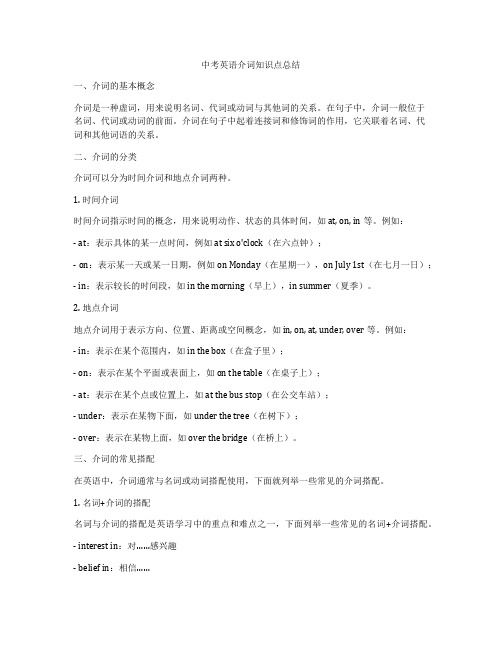
中考英语介词知识点总结一、介词的基本概念介词是一种虚词,用来说明名词、代词或动词与其他词的关系。
在句子中,介词一般位于名词、代词或动词的前面。
介词在句子中起着连接词和修饰词的作用,它关联着名词、代词和其他词语的关系。
二、介词的分类介词可以分为时间介词和地点介词两种。
1. 时间介词时间介词指示时间的概念,用来说明动作、状态的具体时间,如at, on, in等。
例如:- at:表示具体的某一点时间,例如at six o'clock(在六点钟);- on:表示某一天或某一日期,例如on Monday(在星期一),on July 1st(在七月一日);- in:表示较长的时间段,如in the morning(早上),in summer(夏季)。
2. 地点介词地点介词用于表示方向、位置、距离或空间概念,如in, on, at, under, over等。
例如:- in:表示在某个范围内,如in the box(在盒子里);- on:表示在某个平面或表面上,如on the table(在桌子上);- at:表示在某个点或位置上,如at the bus stop(在公交车站);- under:表示在某物下面,如under the tree(在树下);- over:表示在某物上面,如over the bridge(在桥上)。
三、介词的常见搭配在英语中,介词通常与名词或动词搭配使用,下面就列举一些常见的介词搭配。
1. 名词+介词的搭配名词与介词的搭配是英语学习中的重点和难点之一,下面列举一些常见的名词+介词搭配。
- interest in:对……感兴趣- belief in:相信……- experience of:经验- fear of:害怕- love for:爱- success in:成功- hope for:希望- joy at:……的乐趣- surprise at:惊讶2. 动词+介词的搭配动词与介词的搭配也是需要掌握的重点知识点之一。
中考英语语法-介词考超全考点梳理+易错点拨
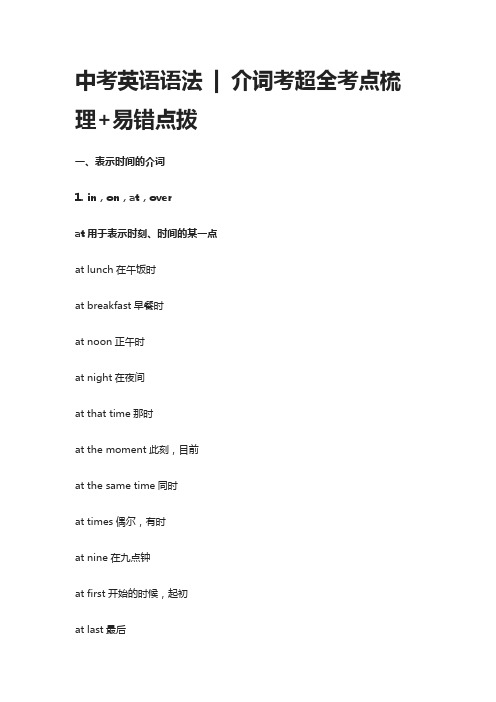
中考英语语法| 介词考超全考点梳理+易错点拨一、表示时间的介词1. in,on,at,overat用于表示时刻、时间的某一点at lunch在午饭时at breakfast早餐时at noon正午时at night在夜间at that time那时at the moment此刻,目前at the same time同时at times偶尔,有时at nine在九点钟at first开始的时候,起初at last最后►We usually have lunch at noon/ at twelve. 我们通常中午吃午饭(十二点吃午饭)。
注意:表示时间的名词前有this, last, next, every等修饰时,其前面不加介词。
this morning今天早上last Monday上周一every week每周on用于表示某天,某一天的上、下午(指具体的某一时,一律用on)on Monday 在周一on Monday evening 在周一晚上on Tuesday morning 在周二早上on June 6在6月6日on May 4,2016 在2016年5月4日on a cold night在一个寒冷的夜晚on that day在那天on Christmas Day在圣诞节那天on time准时on the night of July(the)first 在七月一日的夜晚►We didn’t listen to the lecture on Wednesday afternoon. 周三下午我们没去听演讲。
in用于表示周、月、季节、年和泛指的上午、下午、晚上(指在一段时间内)。
in the week在这周in the holiday在假期中in May 在五月in 1995在1995年in summer在夏季in Spring在春季in autumn在秋季in winter在冬季in September, 1995 在1995年9月in the morning 在上午in the afternoon 在下午in the evening在晚上in the 21st century在二十一世纪in time及时in an hour一个小时后in a minute一会儿,立刻►The plane took off on time.飞机准时起飞了。
初中英语语法知识—介词的知识点总复习含答案解析(3)
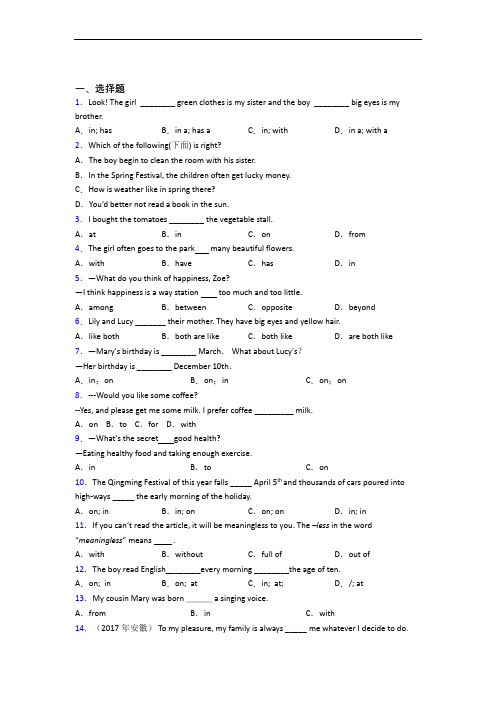
一、选择题1.Look! The girl ________ green clothes is my sister and the boy ________ big eyes is my brother.A.in; has B.in a; has a C.in; with D.in a; with a 2.Which of the following(下面) is right?A.The boy begin to clean the room with his sister.B.In the Spring Festival, the children often get lucky money.C.How is weather like in spring there?D.You’d better not read a book in the sun.3.I bought the tomatoes ________ the vegetable stall.A.at B.in C.on D.from4.The girl often goes to the park many beautiful flowers.A.with B.have C.has D.in5.—What do you think of happiness, Zoe?—I think happiness is a way station too much and too little.A.among B.between C.opposite D.beyond 6.Lily and Lucy _______ their mother. They have big eyes and yellow hair.A.like both B.both are like C.both like D.are both like 7.—Mary's birthday is ________ March. What about Lucy's?—Her birthday is ________ December 10th.A.in;on B.on;in C.on;on8.---Would you like some coffee?--Yes, and please get me some milk. I prefer coffee _________ milk.A.on B.to C.for D.with9.—What's the secret good health?—Eating healthy food and taking enough exercise.A.in B.to C.on10.The Qingming Festival of this year falls _____ April 5th and thousands of cars poured into high-ways _____ the early morning of the holiday.A.on; in B.in; on C.on; on D.in; in11.If you can’t read the article, it will be meaningless to you. The –less in the word “meaningless” means .A.with B.without C.full of D.out of 12.The boy read English________every morning ________the age of ten.A.on; in B.on; at C.in; at; D./; at13.My cousin Mary was born ___ a singing voice.A.from B.in C.with14.(2017年安徽) To my pleasure, my family is always _____ me whatever I decide to do.A.above B.behind C.from D.through15.Shanghai is ________ the east of China and _________ the west of Japan.A.in; to B.in; inC.to; to D.to; in16.The river runs_______ the city. And there are many beautiful bridges_______ the river. A.across; through B.through; overC.through; through D.across; over17.My teacher runs ______ the morning. But he doesn't run ______ Sunday morning. A.in;on B.on;in C.in;in D.on;on18.He often has lunch ______ about twelve o'clock.A.in B.at C.on D.with19.My friend, Henry was born June 10th, 1997.A.in B.on C.at D.for20.There________ a hamburger and bananas________there.A.is;in B.are;in C.is;/ D.are;/21.They got married_______ 1960. That means they have been married _______ 1960. A.at; since B.on; in C.in; since D.for; since22.--Excuse me, Sir. Can you tell me the way to the zoo?--Walk__________the bridge, you'll see the zoo__________your right.A.on; by B.across; at C.across; on D.on; along23.I have to prepare ________my math test________ Friday afternoon.A.at; on B.for; on C.on ;for24.—Where is Hubei?—It’s _______ the north of Hunan.A.in B.to C.on25.Thanks ______your family photos, they are very nice.A.to B.in C.for D.at【参考答案】***试卷处理标记,请不要删除一、选择题1.C解析:C【解析】【分析】【详解】句意:看!那个穿着红色衣服的女孩是我的姐姐,那个有一双大眼睛的男孩是我的弟弟。
中考英语语法专项复习讲解及训练 介词(含答案)

中考英语语法专项复习介词介词是一种用来表示词与词,词与句之间的关系的词。
在句中不能单独作句子成分。
介词后面一般有名词代词或相当于名词的其他词类,短语或从句作它的宾语。
介词和它的宾语构成介词词组,在句中作状语,表语,补语或介词宾语。
中考主要考查表示时间的介词、表示方位的介词、表示方式、手段、或工具的介词by,in,on,with和介词的固定搭配。
对于介词的考察,通常是以单项选择或完形填空形式考查介词用法,尤其是几个易混淆的介词。
另外,介词与动词和形容词构成的固定搭配也是常见的考试内容。
一、表示时间的介词思维导图记知识点时间介词二、表示方位的介词 思维导图记知识点 介词on 表示一物放在另一物上面,两者紧贴在一起方位介词三、表示方式、手段、或工具的介词by,in,on,with.用by 时,交通工具前不用任何词四.常用介词辨析1.in 和on的区别两个词都有“在...后”之意,behind 只表示位置方面的“在....之后”,不能表示时间,而after则表示时间方面的“在...之后”behind the school 在学校后面after 5 o’clock 5点以后(1)of sb 用于It is +adj+of sb to do sth 句型中,形容词为clever, kind , nice 等描述人物性格特征的词,of 后的人物与形容词有主表关系。
It is very kind of you to help the old man .你帮助那位老人真是太好了。
(2)for sb用于It is adj+for sb to do sth 句型中,形容词为easy, important 等不描述人物性格特征的词,for 后的人物与形容词没有主表关系。
It is important for us to study hard 对我们来说努力学习很重要。
15.to的两种用法的区别to 既是介词,又是动词不定式符号。
人教版中考英语复习专题介词知识点总结
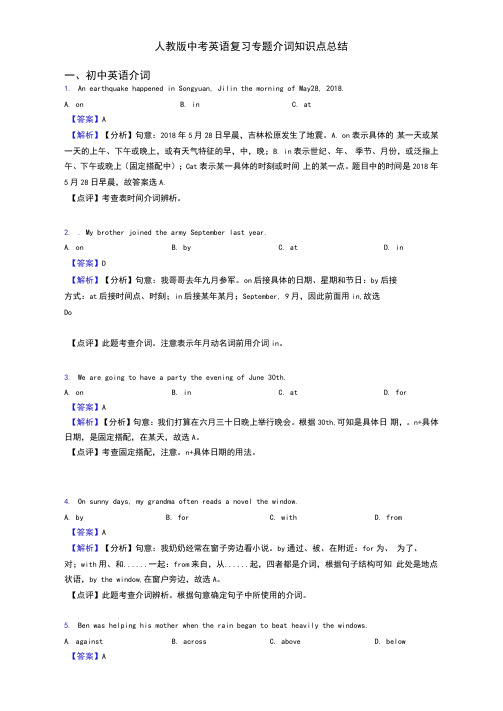
人教版中考英语复习专题介词知识点总结一、初中英语介词1.An earthquake happened in Songyuan, Jilin the morning of May28, 2018.A. onB. inC. at【答案】A【解析】【分析】句意:2018年5月28日早晨,吉林松原发生了地震。
A. on表示具体的某一天或某一天的上午、下午或晚上,或有天气特征的早,中,晚;B. in表示世纪、年、季节、月份,或泛指上午、下午或晚上(固定搭配中);Cat表示某一具体的时刻或时间上的某一点。
题目中的时间是2018年5月28日早晨,故答案选A.【点评】考查表时间介词辨析。
2.. My brother joined the army September last year.A. onB. byC. atD. in【答案】D【解析】【分析】句意:我哥哥去年九月参军。
on后接具体的日期、星期和节日:by后接方式:at后接时间点、时刻;in后接某年某月;September, 9月,因此前面用in,故选Do【点评】此题考查介词。
注意表示年月动名词前用介词in。
3.We are going to have a party the evening of June 30th.A. onB. inC. atD. for【答案】A【解析】【分析】句意:我们打算在六月三十日晚上举行晚会。
根据30th,可知是具体日期,。
n+具体日期,是固定搭配,在某天,故选A。
【点评】考查固定搭配,注意。
n+具体日期的用法。
4.On sunny days, my grandma often reads a novel the window.A. byB. forC. withD. from【答案】A【解析】【分析】句意:我奶奶经常在窗子旁边看小说。
by通过、被、在附近:for为、为了、对;with用、和......一起:from来自,从......起,四者都是介词,根据句子结构可知此处是地点状语,by the window,在窗户旁边,故选A。
译林版中考英语九年级英语初中英语介词考点+例题-全面解析含答案解析
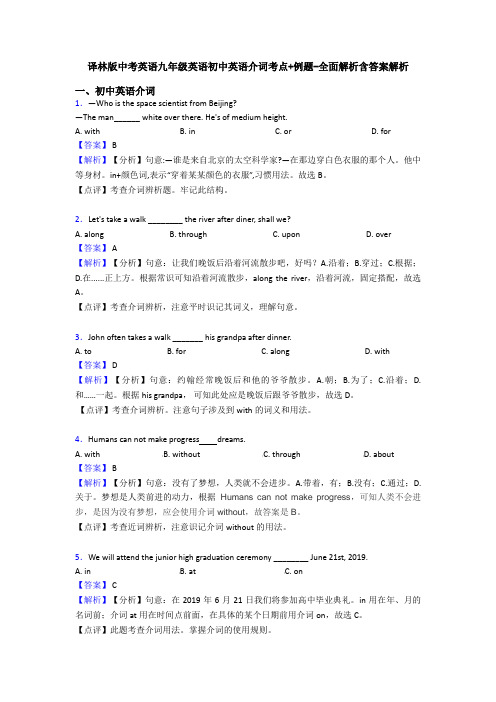
译林版中考英语九年级英语初中英语介词考点+例题-全面解析含答案解析一、初中英语介词1.—Who is the space scientist from Beijing?—The man______ white over there. He's of medium height.A. withB. inC. orD. for【答案】 B【解析】【分析】句意:—谁是来自北京的太空科学家?—在那边穿白色衣服的那个人。
他中等身材。
in+颜色词,表示“穿着某某颜色的衣服”,习惯用法。
故选B。
【点评】考查介词辨析题。
牢记此结构。
2.Let's take a walk ________ the river after diner, shall we?A. alongB. throughC. uponD. over【答案】 A【解析】【分析】句意:让我们晚饭后沿着河流散步吧,好吗?A.沿着;B.穿过;C.根据;D.在......正上方。
根据常识可知沿着河流散步,along the river,沿着河流,固定搭配,故选A。
【点评】考查介词辨析,注意平时识记其词义,理解句意。
3.John often takes a walk _______ his grandpa after dinner.A. toB. forC. alongD. with【答案】 D【解析】【分析】句意:约翰经常晚饭后和他的爷爷散步。
A.朝;B.为了;C.沿着;D.和……一起。
根据his grandpa,可知此处应是晚饭后跟爷爷散步,故选D。
【点评】考查介词辨析。
注意句子涉及到with的词义和用法。
4.Humans can not make progress dreams.A. withB. withoutC. throughD. about【答案】 B【解析】【分析】句意:没有了梦想,人类就不会进步。
A.带着,有;B.没有;C.通过;D.关于。
初中英语介词语法知识点总结(讲义及答案)
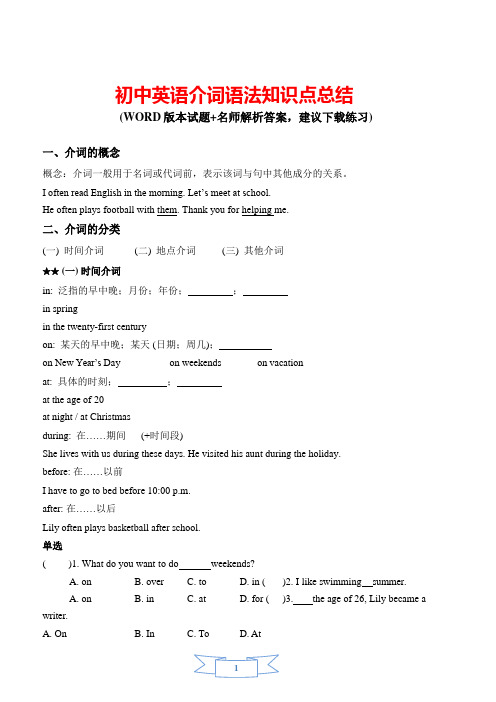
初中英语介词语法知识点总结(WORD版本试题+名师解析答案,建议下载练习)一、介词的概念概念:介词一般用于名词或代词前,表示该词与句中其他成分的关系。
I often read English in the morning. Let’s meet at school.He often plays football with them. Thank you for helping me.二、介词的分类(一) 时间介词(二) 地点介词(三) 其他介词★★ (一) 时间介词in: 泛指的早中晚;月份;年份;;in springin the twenty-first centuryon: 某天的早中晚;某天 (日期;周几);on New Year’s Day on weekends on vacationat: 具体的时刻;;at the age of 20at night / at Christmasduring: 在……期间(+时间段)She lives with us during these days. He visited his aunt during the holiday.before: 在……以前I have to go to bed before 10:00 p.m.after: 在……以后Lily often plays basketball after school.单选( )1. What do you want to do weekends?A. onB. overC. toD. in ( )2. I like swimming summer.A. onB. inC. atD. for ( )3. the age of 26, Lily became a writer.A. OnB. InC. ToD. At( )4. Jim learned to drive ___ the holiday.A. atB. duringC. toD. for( )5. He went to Shanghai July 7, 2013 and came backa cold morning last year.A. in; onB. on; inC. on; onD. in; in( )6. My mom often tells me to go back home dark(黄昏).A. afterB. toC. beforeD. for( )7. A lot of people are here _ vacation every year.A. ofB. onC. atD. with★★ (二) 地点介词1.地点介词 at, in, onat: “在……”(表一个点或小地方)at home at Mr. Cool’s Clothes Storeat the pool at Central Parkin: “在……里” (表一个范围或大地方) in China in Beijing in the water in the parkon: “在……上” (表一个表面,并接触) on the floor on the wall 对比这三个句子:They stood at the door and waited.他们站在门口等着。
初中英语介词专项讲解及练习(包含答案)

初中英语介词专项讲解及练习(包含答案)一.介词的含义介词是一种虚词,用来表示名词或相当于名词的其它词语与句中其它词的关系,不能单独使用。
介词可以与名词或相当于名词的其它词构成介词短语。
二.表示时间的介词at (表示钟点): at 6:30 固定搭配: at noon ; at night ;at present / at the momentin (表示年代/月份/季节): in July; in 2006; in September,1998 ; in spring固定搭配: in the morning / in theafternoon / in the eveningon (表示具体日期: 某月某日/星期几): on Monday ; on Sunday morning ; on December 17before在 --- 之前after 在--之后by在--之前(时间);到--为止until/ till : 直到 --(时间)since自从 -- 以来for(接一段时间)during 在 -- 期间from 从--时起in + 一段时间: --以后(用于将来时)within --之内after+ 一段时间:--以后(用于过去时)beyond --之外三.表示场所,方向的介词at 在某处(小地方)(at the cinema; at school; at home;at the railway station)in 在某处(大地方)(in China;in Beijing);在--里面(in the classroom; in the water)on 在--上面(紧贴着其表面): (on the table; on one’s face) near 在---附近 beside:在--旁边by在--旁边between在--和--之间among在--(3者或更多的人或物)当中in front of 在--的前面behind 在--的后面beside: 在—旁边into 进入--里out of 从--中出来 near / nest to 靠近across穿过(沿着表面)through穿过(从中间)along 沿着from -- to -- 从--到-- around 在--周围over 在--的正上方under在--的正下面/ above 在--斜上方below 在--斜下方四.其他介词in 用(某种语言),穿着(某种颜色的衣服)about大约;关于from 来自 ---as像--(接句子);正如--; like 像--(接单词)with和--起;用-- without 没有-- by通过(某种方式或手段);乘坐by bus(train /plane /ship/bike)on foot五.重要介词辨析(1)on, over与aboveOn 在……上面与物体表面有接触面Over 在……上方垂直正上方,表示“跨越,覆盖”Above在……上方“在……(偏)上方”,表示两者不接触例如:There is a bag on the desk.The lamp is over the table.The heaven is above us.(苍天在上。
最新初中英语语法知识—介词的知识点总复习附答案解析(3)
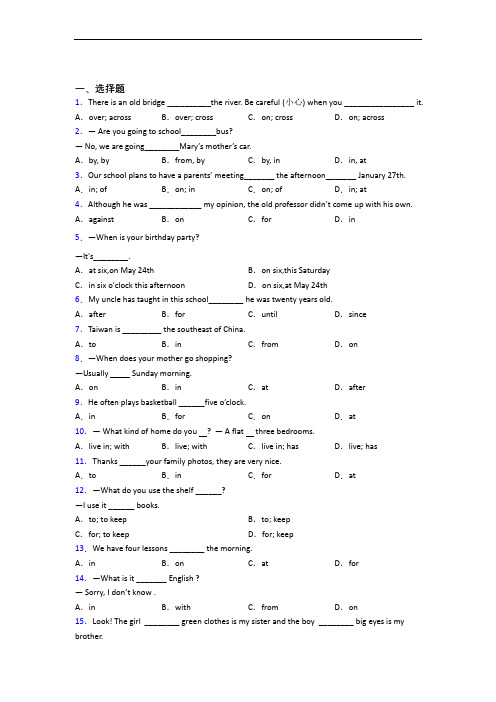
一、选择题1.There is an old bridge __________the river. Be careful (小心) when you ________________ it. A.over; across B.over; cross C.on; cross D.on; across2.— Are you going to school________bus?—No, we are going________Mary’s mother’s car.A.by, by B.from, by C.by, in D.in, at3.Our school plans to have a parents’ meeting_______ the afternoon_______ January 27th. A.in; of B.on; in C.on; of D.in; at 4.Although he was ____________ my opinion, the old professor didn’t come up with his own. A.against B.on C.for D.in5.—When is your birthday party?—It's________.A.at six,on May 24th B.on six,this SaturdayC.in six o'clock this afternoon D.on six,at May 24th6.My uncle has taught in this school________ he was twenty years old.A.after B.for C.until D.since7.Taiwan is _________ the southeast of China.A.to B.in C.from D.on8.—When does your mother go shopping?—Usually Sunday morning.A.on B.in C.at D.after9.He often plays basketball ______five o’clock.A.in B.for C.on D.at10.— What kind of home do you ? — A flat three bedrooms.A.live in; with B.live; with C.live in; has D.live; has 11.Thanks ______your family photos, they are very nice.A.to B.in C.for D.at12.—What do you use the shelf ______?—I use it ______ books.A.to; to keep B.to; keepC.for; to keep D.for; keep13.We have four lessons ________ the morning.A.in B.on C.at D.for14.—What is it _______ English ?—Sorry, I don’t know .A.in B.with C.from D.on15.Look! The girl ________ green clothes is my sister and the boy ________ big eyes is my brother.A.in; has B.in a; has a C.in; with D.in a; with a 16.The river runs_______ the city. And there are many beautiful bridges_______ the river. A.across; through B.through; overC.through; through D.across; over17.My teacher runs ______ the morning. But he doesn't run ______ Sunday morning. A.in;on B.on;in C.in;in D.on;on 18.The accident took place ________ a cold February evening.A.on B.in C.at D.for19.It is not easy to cross the river ________ a ropeway.A.from B.with C.by D.on20.---Do you prefer coffee _____milk in it?---Sometimes, but most of the time I ______drink black coffee.A.or, would rather B.with, prefer C.with, would rather D.to, prefer 21.My friend, Henry was born June 10th, 1997.A.in B.on C.at D.for22.They got married_______ 1960. That means they have been married _______ 1960. A.at; since B.on; in C.in; since D.for; since 23.Tom was born________London________May lst, 2001.A.in; in B.in; on C.on; on D.on; in 24.Don’t leave the room _____ the light on .A.in B.on C.about D.with25.My cousin Mary was born ___ a singing voice.A.from B.in C.with【参考答案】***试卷处理标记,请不要删除一、选择题1.B解析:B【解析】【分析】【详解】句意:河上有一座古老的桥。
初中英语语法基础——介词专题讲解 (附同步练习试题)
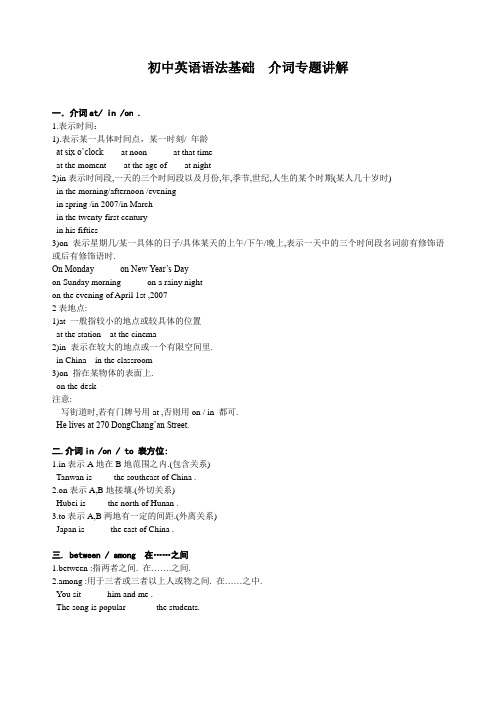
初中英语语法基础介词专题讲解一.介词at/ in /on .1.表示时间:1).表示某一具体时间点,某一时刻/ 年龄at six o’clock at noon at that timeat the moment at the age of at night2)in表示时间段,一天的三个时间段以及月份,年,季节,世纪,人生的某个时期(某人几十岁时)in the morning/afternoon /eveningin spring /in 2007/in Marchin the twenty-first centuryin his fifties3)on表示星期几/某一具体的日子/具体某天的上午/下午/晚上,表示一天中的三个时间段名词前有修饰语或后有修饰语时.On Monday on New Year’s Dayon Sunday morning on a rainy nighton the evening of April 1st ,20072表地点:1)at 一般指较小的地点或较具体的位置at the station at the cinema2)in 表示在较大的地点或一个有限空间里.in China in the classroom3)on 指在某物体的表面上.on the desk注意:写街道时,若有门牌号用at ,否则用on / in 都可.He lives at 270 DongChang’an Street.二.介词in /on / to 表方位:1.in表示A地在B地范围之内.(包含关系)Tanwan is ____ the southeast of China .2.on表示A,B地接壤.(外切关系)Hubei is ____ the north of Hunan .3.to表示A,B两地有一定的间距.(外离关系)Japan is _____ the east of China .三. between / among 在……之间1.between :指两者之间. 在…….之间.2.among :用于三者或三者以上人或物之间. 在……之中.You sit _____ him and me .The song is popular ______ the students.四.after / in 在……之后 before / in 在……之前1. after1)after + 时间段. 表示以过去某一时刻为起点的一段时间之后, 用于过去时.2)after 作介词. after doing sth.2.in +一段时间. 表示说话时或以现在为起点的将来一段时间之后.用于将来时.He came back ______ two days .He will go home___finishing his homework .He will come back _____ two days .3. before 多用于时间点或一件事之前发生,即“先于……;在……之前”He left the office bofore I got there. I’ll be back before five o’clock.4. ago 时间段+ ago 表示“多久之前”时态通常用:一般过去时I met Tom two days ago.五.with / in / by 表示“用……”1.with 表示“用…” 一般指有形的工具/ 手段/ 人体器官.He cut the apple into halves ____ a knife .注: with 表伴随, “带有,含有”He came in _____ a big smile on his face .2.in表示用某种语言,方式,途径. 或书写/绘画所用的材料. 也可表交通方式.Can you say it _____English ?He wrote a letter ____ blue ink .3.by表示乘坐交通工具, 表示方式,方法I study for a test _____ working with a group .He makes a living ____ selling newspapers .注意: 同义词组1).by phone = on the phone2).by car = in a car3).in pen = with a pen = with pens六.across / through / over / by 经过1.across 指横穿,穿过. 表示动作从某一物体表面上经过.2.through 指穿过,透过,表示从某一物体空间内通过.3.over 表示从某人或某物的上空经过或越过,不与表面接触.4.by 表示从某人/某物的旁边经过.Can you swim ______ the river ?the elephant is so big that it can’t go _____ the gate .I don’t think anyone can jump ___ the fenc e.I walked _____ the bank of China yesterday .七.in front of / in the front of1.in the front of 表示在…….内部的前面2.in front of 表示在……外面的前面There is a desk in _____ front of our classroom .There is a big tree in _____ front of our classroom.八.其它介词的用法:1.at的其它用法.1).表示“从事或正在做某事”,其后加的名词往往不加冠词.She is at work now = She is working now .2)at表示“价格或速度”The train ran at 120 kilometers an hour .2.in的其它用法:1)in表示“在……方面”词组:do well in = be good atbe weak in2)in 表示“穿着”后接表颜色的词或衣服.词组: be in +衣服= be wearing +衣服3)in作副词, “在家” = at home3.like 的用法:1).像/和……一样. 常与系动词连用.词组: look like sound like2).与what 连用, “是什么样子, 怎样”.What is he like ? He is kind .4.off的用法:1).从……下来, 脱离某物体.词组: fall off2). “休假”通常放在时间名词之后.词组: have +时间+ offHe has n’t had a night off for two hours .5.except / besides1).except 除了…….之外, 都……. . 不包括在范围之内.注: nothing but … 除了……之外,什么也没有.2).besides除了……之外,还有…… . 包括在范围之内.We all went swimming ______ Lucy .There is _______ a letter in the box .We study Japanese and French____ English .6.with / without1).with具有,含有反义词: without 没有词组: with the help of = with one’s help =because of = thanks towithout one’s help2).without 的用法:A).without + sb./ sth. 没有某人或某物B).without + doing sth . He lef t here without____(say ) “Goodbye”to usC). without sth 常与if 引导的否定的条件句.If there is no water , we can’t live .= We can’t live ______ _______ .7.on the tree /in the treeon the tree 表示“树上本身长的东西” 在树上.in the tree 表示“外界的物体进入树中” 人或物在树上.There are some apples _____ the tree .There is a boy ____ the tree.8.表示“数量的介词”about , round around , over1). about , round around表示“大约……”2).over 表示“超过”= more than.9.inside / outsideInside 在……里面------反义词:outside在….外面10.in the wall /on the wallin the wall 表示“门窗在墙上” on the wall 表示“某东西张贴或挂在墙上”九.不用介词的情况:1).当时间状语为: tonight, today, yesterday, tomorrow 等时,不用介词. What are you going to do tonight ?2).含有this, that, these, those, last, next, every/each day等时间状语.He went to Wuhan last week . I drink milk every day.3).以all 开头的时间状语前面不用介词.He has worked all day .4).以some ,any, one 等构成的时间状语前不用介词.He met a bad man one cold morning. = He met a bad man on a cold morning.介词专题小测:一、单项选择题。
初中英语语法知识—介词的知识点总复习有答案解析
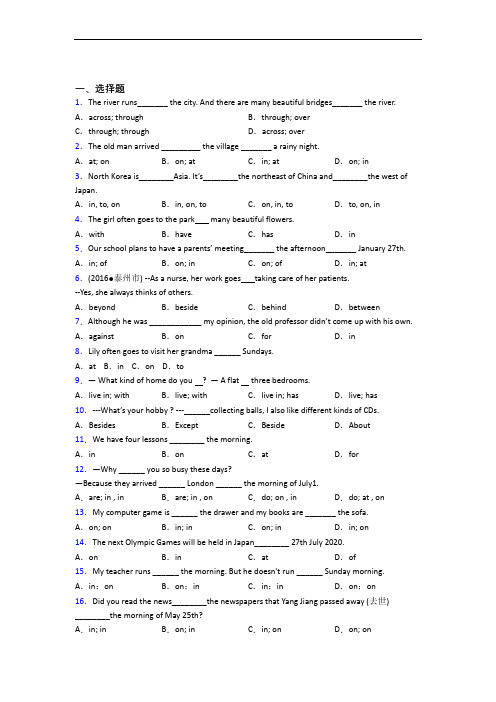
一、选择题1.The river runs_______ the city. And there are many beautiful bridges_______ the river. A.across; through B.through; overC.through; through D.across; over2.The old man arrived _________ the village _______ a rainy night.A.at; on B.on; at C.in; at D.on; in3.North Korea is________Asia. It’s________the northeast of China and________the west of Japan.A.in, to, on B.in, on, to C.on, in, to D.to, on, in 4.The girl often goes to the park many beautiful flowers.A.with B.have C.has D.in5.Our s chool plans to have a parents’ meeting_______ the afternoon_______ January 27th. A.in; of B.on; in C.on; of D.in; at 6.(2016●泰州市) --As a nurse, her work goes taking care of her patients.--Yes, she always thinks of others.A.beyond B.beside C.behind D.between 7.Although he was ____________ my opinion, the old professor didn’t come up with his own. A.against B.on C.for D.in8.Lily often goes to visit her grandma ______ Sundays.A.at B.in C.on D.to9.— What kind of home do you ? — A flat three bedrooms.A.live in; with B.live; with C.live in; has D.live; has10.---What’s your hobby ? ---______collecting balls, I also like different kinds of CDs. A.Besides B.Except C.Beside D.About11.We have four lessons ________ the morning.A.in B.on C.at D.for 12.—Why ______ you so busy these days?—Because they arrived ______ London ______ the morning of July1.A.are; in , in B.are; in , on C.do; on , in D.do; at , on 13.My computer game is ______ the drawer and my books are _______ the sofa.A.on; on B.in; in C.on; in D.in; on14.The next Olympic Games will be held in Japan________ 27th July 2020.A.on B.in C.at D.of15.My teacher runs ______ the morning. But he doesn't run ______ Sunday morning. A.in;on B.on;in C.in;in D.on;on 16.Did you read the news________the newspapers that Yang Jiang passed away (去世)________the morning of May 25th?A.in; in B.on; in C.in; on D.on; on17.If success is a gate, the road this gate must be made up of difficulties.A.towards B.against C.opposite D.beyond 18.After working her way around the world, Annie ended up English as a foreign language. A.teach B.taughtC.teaching D.to teach19.—What's the weather _______ in Spring?—Pardon?(什么,请再说一遍)—How is the weather________in Spring?A.like;/ B./;like C.be like;/ D./;be like20.—It's wonderful, isn't it?— Yes, The large grassland, reaching out far away, looks very beautiful________the blue and clean sky.A.against B.above C.through D.past21.I have to prepare ________my math test________ Friday afternoon.A.at; on B.for; on C.on ;for22.—Hi, Jane. What time do you get up __________ weekdays?—I usually get up __________ about six o’clock.A.in; at B.on; at C.at; at D.on; on 23.(2017年安徽) To my pleasure, my family is always _____ me whatever I decide to do. A.above B.behind C.from D.through24.We started out in early spring and headed west the northern part of Asia. A.through B.between C.among D.across 25.—How long have you lived in this town?—________2001.A.since B.in. C.for【参考答案】***试卷处理标记,请不要删除一、选择题1.B解析:B【解析】试题分析:句意:这条河穿过城市。
九年级下英语常用语法知识——介词知识点(答案解析)

一、选择题1.We _______ keep the new traffic law and learn how to protect ourselves.A.may B.should C.can D.need B解析:B【解析】句意:我们应该遵守新的交通法规,学会保护自己。
A. may可以;B. should应该;C. can 能,可以;D. need需要。
建议对方做某事一般用情态动词should,故答案为B。
2.—I’d like ________ Guo Jingming’s Tiny Times.—You had better________ his books. The stories he tells are far from real life.A.buying, don’t read B.to buy, not readC.buying, not read D.to buy, not to read B解析:B【解析】【详解】句意:——我想买郭敬明的《小时代》。
——你最好不要读他的书。
他讲的故事与现实生活相去甚远。
考查非谓语动词及固定句型。
短语would like to do sth.愿意去做某事;第一空排除AC;You had better+动词原形,你最好做某事;You had better not+动词原形,你最好不要做某事。
第二空排除D。
根据题意,故选B。
3.Since you are very tired, you ______ finish the work today.A.needn’t B.may not C.mustn’t D.can’t A解析:A【解析】【详解】句意:既然你很累,今天就不必完成这项工作了。
A. needn’t不必;B. may not 可能不;C. mustn’t禁止;D. can’t不能。
根据上文Since you are very tired,可知,情态动词needn’t表示不需要,后面直接加动词原形。
九年级英语专题复习教案:介词和介词短语知识讲解(中考资料)
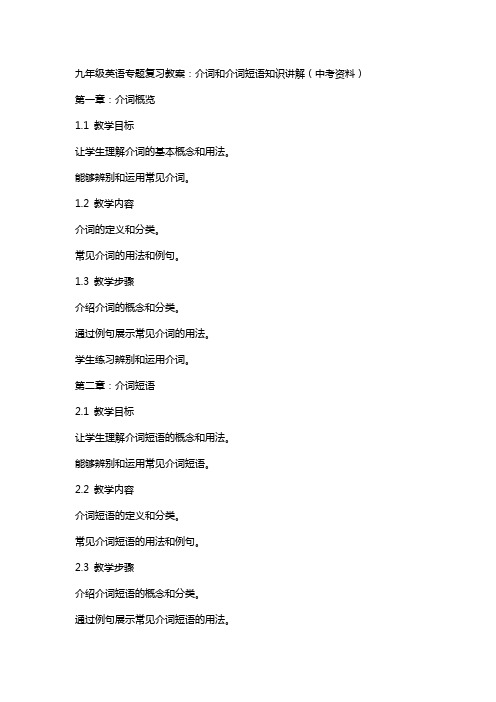
九年级英语专题复习教案:介词和介词短语知识讲解(中考资料)第一章:介词概览1.1 教学目标让学生理解介词的基本概念和用法。
能够辨别和运用常见介词。
1.2 教学内容介词的定义和分类。
常见介词的用法和例句。
1.3 教学步骤介绍介词的概念和分类。
通过例句展示常见介词的用法。
学生练习辨别和运用介词。
第二章:介词短语2.1 教学目标让学生理解介词短语的概念和用法。
能够辨别和运用常见介词短语。
2.2 教学内容介词短语的定义和分类。
常见介词短语的用法和例句。
2.3 教学步骤介绍介词短语的概念和分类。
通过例句展示常见介词短语的用法。
学生练习辨别和运用介词短语。
第三章:介词和介词短语的辨析3.1 教学目标让学生能够辨别和正确运用介词和介词短语。
3.2 教学内容介词和介词短语的辨析方法。
常见介词和介词短语的混淆点。
3.3 教学步骤介绍介词和介词短语的辨析方法。
通过例题展示常见介词和介词短语的混淆点。
学生进行辨析练习。
第四章:介词和介词短语的运用4.1 教学目标让学生能够熟练运用介词和介词短语。
4.2 教学内容介词和介词短语的运用技巧。
常见介词和介词短语的运用场景。
4.3 教学步骤介绍介词和介词短语的运用技巧。
通过例题展示常见介词和介词短语的运用场景。
学生进行运用练习。
第五章:中考介词和介词短语题型解析5.1 教学目标让学生了解中考介词和介词短语的题型。
掌握解题技巧和方法。
5.2 教学内容中考介词和介词短语的题型分析。
解题技巧和方法。
5.3 教学步骤分析中考介词和介词短语的题型。
分享解题技巧和方法。
学生进行真题练习。
第六章:介词和介词短语的综合练习6.1 教学目标让学生通过综合练习巩固介词和介词短语的知识。
提高学生的综合运用能力。
6.2 教学内容综合练习题:包括选择题、填空题、改错题等。
6.3 教学步骤给学生发放综合练习题。
学生独立完成练习题。
老师讲解答案并指出学生常见错误。
第七章:介词和介词短语的拓展知识7.1 教学目标让学生了解介词和介词短语的拓展知识。
人教版中考英语专项训练初中英语介词X知识点总结含答案解析

人教版中考英语专项训练初中英语介词X知识点总结含答案解析一、初中英语介词1.—I'm thirsty. I'd like a glass of orange juice. What about you, Andy?—I prefer a cup of tea ______ nothing in it.A. withB. forC. toD. without【答案】 A【解析】【分析】句意:——我渴了。
我想要一杯橙汁。
你呢,安迪?——我更想要一杯茶,什么都不加。
A. with 和,跟,带有;B. for 为,为了;C. to 向,朝着;D. without 没有。
根据nothing,可知是什么都不加,用with,表伴随,故选A。
【点评】考查介词辨析。
注意区分不同介词的用法。
2.We will attend the junior high graduation ceremony ________ June 21st, 2019.A. inB. atC. on【答案】 C【解析】【分析】句意:在2019年6月21日我们将参加高中毕业典礼。
in用在年、月的名词前;介词at用在时间点前面,在具体的某个日期前用介词on,故选C。
【点评】此题考查介词用法。
掌握介词的使用规则。
3. , I found the job boring, but soon I got used to it.A. To start withB. First of allC. Without doubtD. After all【答案】 A【解析】【分析】句意:起初我觉得工作很无聊,但是我很快就适应了。
A.起初,B.首先,C.毫无疑问,D.毕竟。
根据后半句“不久以后才适应,前后句进行对比,说明刚开始是不适应的,句子缺少时间状语,用to start with符合题意,故答案选A。
【点评】考查短语辨析。
注意识记to start with的词义和用法。
- 1、下载文档前请自行甄别文档内容的完整性,平台不提供额外的编辑、内容补充、找答案等附加服务。
- 2、"仅部分预览"的文档,不可在线预览部分如存在完整性等问题,可反馈申请退款(可完整预览的文档不适用该条件!)。
- 3、如文档侵犯您的权益,请联系客服反馈,我们会尽快为您处理(人工客服工作时间:9:00-18:30)。
一、选择题1.He often has lunch ______ about twelve o'clock.A.in B.at C.on D.with2.— Are you going to school________bus?—No, we are going________Mary’s mother’s car.A.by, by B.from, by C.by, in D.in, at 3.—What do you think your life will________next year?—My life will be________better than it is now.A.be like; very B.be like; a lot C.be; a lot4.I bought the tomatoes ________ the vegetable stall.A.at B.in C.on D.from5.The bird’s singing came into my room ______ the window and woke me up in the early morning.A.down B.from C.through D.across6.--There are many theatres _________the island.--Yes, Broadway is the southern end of the island..A.at; at B.on; on C.at; on D.on; at 7.Taiwan is _________ the southeast of China.A.to B.in C.from D.on8.— What kind of home do you ? — A flat three bedrooms.A.live in; with B.live; with C.live in; has D.live; has 9.Thanks ______your family photos, they are very nice.A.to B.in C.for D.at10.Look! The girl ________ green clothes is my sister and the boy ________ big eyes is my brother.A.in; has B.in a; has a C.in; with D.in a; with a 11.Shanghai is ________ the east of China and _________ the west of Japan.A.in; to B.in; inC.to; to D.to; in12.—There is a hole in the wall. What is it for?—We have a dog. He can get in or out ________ it.A.past B.through C.across D.over13.My teacher runs ______ the morning. But he doesn't run ______ Sunday morning. A.in;on B.on;in C.in;in D.on;on14.I want to learn English well because I don’t want to tal k with foreigners ________ anybody else.A.by B.through C.across D.at15.— Hey, Nancy. What do you usually do ________ rainy days? — I usually listen to music.A.in B.on C.at D.to 16.(2017年山东德州)A woman stood ______ the window, watching the children playing games in the garden.A.past B.through C.across D.by17.It is not easy to cross the river ________ a ropeway.A.from B.with C.by D.on 18.Nature has given us the ability to learn________watching others. Children do it naturally. A.by B.in C.on19.After working her way around the world, Annie ended up English as a foreign language. A.teach B.taughtC.teaching D.to teach20.There________ a hamburger and bananas________there.A.is;in B.are;in C.is;/ D.are;/21.—It's wonderful, isn't it?— Yes, The large grassland, reaching out far away, looks very beautiful________the blue and clean sky.A.against B.above C.through D.past 22.—Hi, Jane. What time do you get up __________ weekdays?—I usually get up __________ about six o’clock.A.in; at B.on; at C.at; at D.on; on 23.—What are these ________ English?—These are egg-cups.A.at B.to C.on D.in24.He has a garden __________ a lot of flowers.A.has B.there is C.with25.—Where is Tom?—He is playing football ___________ the playground.A.of B.to C.on D.from【参考答案】***试卷处理标记,请不要删除一、选择题1.B解析:B【解析】【分析】【详解】句意:他经常在大约十二点吃午餐。
考查介词。
in表示年、月、季节或泛指上午、下午、晚上;at用于表示某一具体时刻或时间点;on指具体的某一天或某天的上午、下午、晚上;with表示“和,跟”。
根据“about twelve o'clock.”可知,这是具体的时刻,因此用介词at。
故选B。
2.C解析:C【解析】【详解】句意:——你将要乘坐公交车去上学吗?——不,我们将乘坐玛丽母亲的车去。
本题考查介词。
from来自,at在,表示“乘坐……”,用by+表示交通工具的单数名词,或者in+one’s+表示交通工具的单数名词;by bus乘坐公交车,in Mary’s mother’s car乘坐玛丽母亲的车。
故选C。
3.B解析:B【解析】【详解】句意:——你认为你明年的生活将会怎么样?——我的生活将会比现在更好。
考查介词用法和形容词比较级修饰词。
do you think为插入语,What…be like中like为介词,what作like的宾语,表示“明年的生活会怎么样”,排除C;第二个空修饰形容词比较级better,very修饰形容词原级,a lot可以修饰比较级。
故选B。
4.A解析:A【解析】【分析】【详解】句意:我在蔬菜店买了西红柿。
考察地点介词。
at后跟小地点,in 后跟大地点,on 表示在….上面,from表示来自。
这里the vegetable stall 是一个小地点,所以前用介词at。
5.C解析:C【解析】【详解】句意:鸟儿的歌声透过窗户进入我的房间,一大早就把我吵醒了。
本题可用“语境分析法”解答。
down“沿着;向下”;from“来自”;through“(从物体内部或空间)穿过”;across“(从物体表面)穿过”。
由句意“鸟的歌声从窗户传进我的房间……”可知选C。
6.D解析:D【解析】【分析】【详解】句意:——这个岛上有许多剧院_。
——是的,百老汇是在岛的最南端。
表示在某个岛上习惯用介词on,即on the island;at the end of在……的末端。
故选D。
7.B解析:B【解析】【分析】【详解】句意:台湾在中国的东南方。
考查介词的用法。
in表示在范围内;on表示接壤;to表示不接壤;from是来自。
根据句意以及常识可知,台湾在中国的东南方,在中国范围之内,故选B。
8.A解析:A【解析】【详解】句意:-你喜欢住在什么样的家里?-一个带三个卧室的公寓。
考查谓语动词,live in住在某地;live居住,不及物动词;has有,动词;with带有,介词。
在第一个句子中,what是句子的宾语,故live后应加介词in,排除B和D;答语是省略回答,完整回答是I live in a flat….,故空后是一个后置定语,修饰名词A flat,应用介词with。
故选A。
9.C解析:C【解析】【分析】【详解】句意:谢谢你的家庭照片,它们非常漂亮。
考查介词辨析题。
thank不和in及at搭配,可排除BD两项。
thanks to幸亏,后接代词;thank for为……而感谢,后接名词或动名词。
根据句意语境,可知thanks to不合句意,故选C。
10.C解析:C【解析】【分析】【详解】句意:看!那个穿着红色衣服的女孩是我的姐姐,那个有一双大眼睛的男孩是我的弟弟。
考查介词及零冠词。
“in+颜色+(衣物名词)”表达“穿着什么颜色的衣服”;clothes是一个集体数名词,本身就是复数,前面不需要加a。
第二句“is ”是句子的谓语部分,空处不需要动词只需要加介词“with”表示伴随状态描述人的相貌“有一双大眼睛的男孩”;eyes是一个复数名词,前面不需要加a。
故选C。
11.A解析:A【解析】【分析】【详解】句意:上海在中国的东部,日本的西面。
考查介词。
in表示在一个范围之内的某个方向上;to表示不在一个范围内的某个方向上。
根据句意可知,上海是中国的一个城市,属于中国的范围,但是不属于日本,因此应选A。
